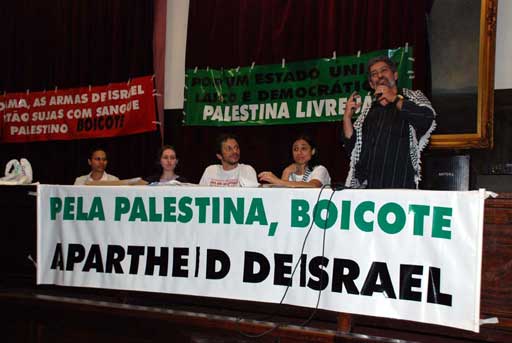BDS forbidden by law -US- and dictat -UK
1) Ma’an news; 2) FCO statement on settlements; 3) JTA surveys positions in the USA

Launching the Brazilian BDS campaign, Sao Paulo, October 2011 (‘For Palestine, boycott apartheid Israel’).
Obama signs into law anti-BDS trade agreement
By Ma’an news
February 27, 2015
BETHLEHEM — US President Barack Obama this week signed into law a sweeping trade agreement that protects Israel from boycott, divestment, and sanctions (BDS) by countries who oppose the ongoing military occupation of Palestinians.
The agreement — H.R. 644: Trade Facilitation and Trade Enforcement Act of 2015 — was passed 75-20 in the Senate on Feb. 11 and later signed into law by the president on Feb. 24.
The agreement reiterates that US Congress “opposes politically motivated actions that penalize or otherwise limit commercial relations specifically with Israel,” referring directly to BDS activities.
The act also cites that congress “supports efforts” to prevent international organizations or governments from carrying out investigation or prosecution of US citizens who do business with “Israel, with Israeli entities, or in any territory controlled by Israel.”
The provision in effect allows US citizens immunity from conducting trade with illegal Israeli settlements, while its terminology fails to distinguish Israeli settlements from the state of Israel.
This terminology violates the US’ official line against settlements in occupied East Jerusalem and the West Bank. But, the White House earlier this month said: “As with any bipartisan compromise legislation, there are provisions in this bill that we do not support.”
Despite the contravention, the White House said that Obama would sign the agreement into law “to help strengthen enforcement of the rules and level the playing field for American workers and businesses.”
The US government opposes the BDS movement against Israel, and while US law requires that products made in illegal Israeli settlements may not be labelled “Made in Israel,” the law is rarely enforced.
The BDS movement aims to exert political and economic pressure over Israel’s occupation of the Palestinian territories in a bid to repeat the success of the campaign which ended apartheid in South Africa.
Israel has been struggling to tackle a growing Palestinian-led boycott campaign which has had a number of high-profile successes abroad.
Moves inside the US — Israel’s longstanding ally and number one provider of military aid — to criminalize BDS have been slammed by human rights defenders as a violation of free speech.
A similar trend ran through the UK earlier this month following British proposals to forbid a boycott of Israeli settlement goods by publicly-funded British institutions.
Rafeef Ziadah, a spokesperson for the UK branch of the Palestinian BDS National Committee, slammed Britain’s proposed regulation.
“By undermining local democracy in service of Israel, David Cameron is standing on the wrong side of history, just as Margaret Thatcher did with her support for apartheid South Africa,” Ziadah said.
UK Government position on settlements
Press Release from FCO, January 22, 2016
Foreign Secretary comments on Israeli Government’s decision to declare 385 acres of land in the West Bank as ‘state land’
Foreign Secretary Philip Hammond expresses concern about Israel’s recent decision and underlines the UK’s position on Israeli settlements.
Mr Hammond said:
I’m concerned that the Israeli Government intends to declare 385 acres of land in the West Bank as ‘state land’, which would be the largest declaration of this kind since August 2014.
The UK’s long-held position on Israeli settlements, and that of our international partners, is clear: they are illegal under international law, are an obstacle to peace and undermine the prospects for a two-state solution. The UK strongly opposes any moves which take us further away from an enduring peace settlement.

Children in Gaza
Obama weighs in on BDS settlement fight – but battle likely won’t end there
By Ron Kampeas, JTA
February 25, 2016
The controversy over whether laws protecting Israel from boycotts should include West Bank settlements found its way into a presidential signing statement this week. But President Barack Obama’s decision to ignore a trade law’s requirement to oppose boycotts of Israeli settlements likely won’t settle the argument.
The president said Wednesday he had signed the Trade Facilitation and Trade Enforcement Act of 2015 and embraced its provisions protecting Israel from the Boycott, Divestment and Sanctions movement, or BDS. But Obama also said he would not observe the measure’s requirement to extend those protections to businesses in “Israeli-controlled territories.”
“I have directed my administration to strongly oppose boycotts, divestment campaigns and sanctions targeting the State of Israel,” he said. “As long as I am president, we will continue to do so. Certain provisions of this act, by conflating Israel and ‘Israeli-controlled territories,’ are contrary to longstanding bipartisan United States policy, including with regard to the treatment of settlements.”
Using language that has appeared previously in signing statements to indicate a president will not implement parts of bills that do not comport with U.S. foreign policy, the statement added that “consistent with longstanding constitutional practice,” Obama would continue to negotiate with other countries “in a manner that does not interfere with my constitutional authority to conduct diplomacy.”
Obama’s statement is the latest salvo in an intensifying battle over whether the United States should differentiate between economic activity in West Bank settlements and Israel proper. Proponents of eliminating the distinction say there is little difference between Israel and the West Bank when it comes to countering BDS, while others contend that lumping in settlements undercuts the wider effort to counter the boycott movement.
The argument is already playing out in 22 state legislatures that are considering anti-BDS bills — some of which explicitly protect businesses operating in the settlements, while others extend protections only to Israel proper. It also cropped up in January in the controversy over the reissuing of customs regulations requiring goods produced in the West Bank to be labeled as such.
Both Illinois and South Carolina have enacted laws in the past year that include protections for settlements. The Florida Legislature did the same this week, and a similar bill was introduced this week in Ohio.
In Washington, a bill introduced earlier this month would remove federal obstacles for states seeking to divest from entities that boycott Israel. The bill names as its target those who would use economic means to harm “Israel or persons doing business in Israel or in Israeli-controlled territories.” The American Israel Public Affairs Committee backs the bill.
AIPAC, along with the Jewish Federations of North America and the American Jewish Committee, is also backing a nonbinding resolution in the House of Representatives opposing new European Union rules that label settlement goods. Rep. Pete Roskam, R-Ill., who authored the resolution with Rep. Nita Lowey, D-N.Y., said he doesn’t see a difference between BDS and moves to label settlement goods.
“The motivation for people who are pushing the BDS movement and some who are behind the EU labeling law is not the welfare and good wishes to the State of Israel,” said Roskam, who along with Rep. Juan Vargas, D-Calif., authored the language in the trade act signed Wednesday by Obama.
Lowey, in an email, said the European labelling “propels the BDS movement.”
“The EU’s new labelling policy also represents an attempt to extract concessions from Israel outside of the peace process, and therefore makes it much harder to ever resume direct negotiations between Israelis and Palestinians,” she said.
Jeremy Ben-Ami, the president of J Street, which is lobbying against the Roskam-Lowey resolution, said lumping Israeli products with settlement goods undercuts broader efforts to counter the BDS movement. J Street’s university affiliate has taken a lead role in pushing back against BDS on campuses.
Without even a whisper of honest debate, an historic shift in U.S. policy is quietly being legislated — a shift that could have devastating consequences for the possibility of any peaceful solution to the Israeli-Palestinian conflict
Lara Friedman, APN
“When the distinction between Israel and the green line is erased, there is a danger,” Ben-Ami said. “You’re putting your nose under the one-state tent when you conflate the West Bank and Israel.”
Lara Friedman, the government affairs director for Americans for Peace Now, which has monitored the anti-BDS effort at the state level, says the effort to extend protections to settlement products is an effort to undercut longstanding U.S. policy.
“Without even a whisper of honest debate, an historic shift in U.S. policy is quietly being legislated — a shift that, if left unchallenged, will have devastating consequences for the possibility of any peaceful solution to the Israeli-Palestinian conflict,” Friedman said in an email.
In January, the Customs and Border Protection Bureau [CBP] restated 20-year-old rules requiring labelling of goods from the West Bank. JTA has learned that the reissued rules followed several complaints filed by activists seeking to ensure that the United States abides by its own policy of distinguishing economic output from Israel and the West Bank.

Students viewing a mock apartheid wall at Hampshire college, Mass., SJP [Students for Justice for Palestinians] erected on the library lawn, across the college’s main walk-way, 2011
Sen. Tom Cotton, R-Ark., responded to the bureau’s announcement by introducing a bill to override the rules. He was joined by Sen. Ted Cruz, R-Texas, a candidate for the Republican presidential nod. The Zionist Organization of America accused the Obama administration of changing U.S. policy.
The bureau, a division of the Department of Homeland Security, insisted the guidance was routine and issued after a series of complaints.
“CBP’s January 23rd message was simply a restatement of existing requirements and was issued in response to recent mislabeling allegations received by CBP,” a spokeswoman told JTA in an email.
See also: Lose the argument, ban free speech
